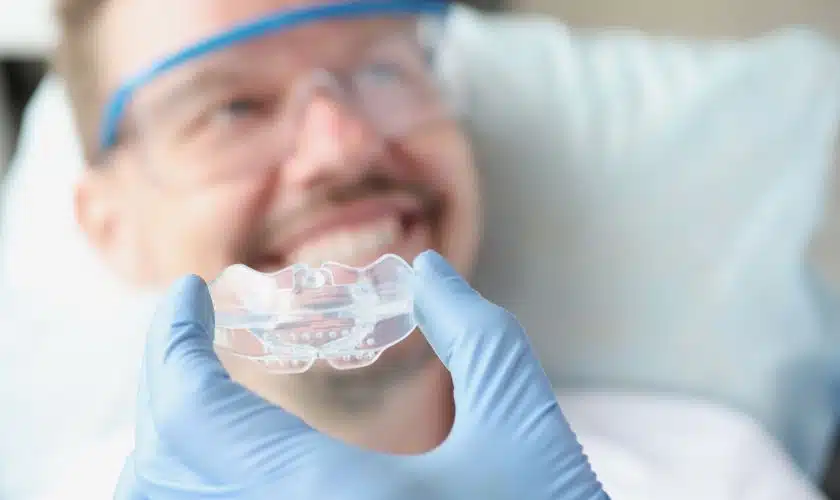
Why Mouthguards Are Vital for Dental Health?
In the fast-paced world of sports and physical activities, one essential piece of equipment often gets overlooked: the mouthguard. These seemingly simple devices play a crucial role in safeguarding our dental health, yet their importance is frequently underestimated. Let’s delve into why mouthguards are not just an optional accessory but a vital necessity for preserving our smiles.
Reasons Mouthguards Are Important for Dental Health:
1. Prevention of Traumatic Injuries
Traumatic injuries to the mouth are all too common in contact sports like football, basketball, and hockey, as well as in activities like skateboarding and martial arts. Without proper protection, a single blow to the face can result in cracked or broken teeth, jaw fractures, and soft tissue injuries. However, wearing a mouthguard significantly reduces the risk of such injuries by cushioning the impact and distributing the force evenly across the teeth and jaws.
2. Shield Against Dental Fractures
One of the primary functions of mouthguards is to act as a shield against dental fractures. The sturdy yet flexible material of a mouthguard absorbs the shock of sudden impacts, preventing the teeth from cracking or breaking upon impact. This protection is especially crucial for individuals who participate in high-contact sports where collisions and falls are frequent occurrences. By providing a barrier between the upper and lower teeth, mouthguards effectively minimize the risk of dental trauma and costly restorative treatments.
3. Prevention of Soft Tissue Injuries
While the focus is often on protecting the teeth, mouthguards also play a vital role in preventing soft tissue injuries within the oral cavity. Lips, cheeks, gums, and tongue are all susceptible to lacerations and contusions during sports and physical activities. A properly fitted mouthguard creates a buffer between the teeth and the delicate tissues of the mouth, reducing the likelihood of cuts, bruises, and other injuries. By minimizing trauma to the soft tissues, mouthguards not only prevent pain and discomfort but also lower the risk of infection and promote faster healing.
4. Safeguarding Against Jaw Fractures
In addition to protecting the teeth and soft tissues, mouthguards also provide crucial support for the jawbone. A strong impact on the face can exert tremendous force on the jaw, leading to fractures or dislocations. By stabilizing the jaw and absorbing some of the energy from a blow, mouthguards help reduce the risk of serious injuries to this vital part of the facial structure. This added protection is essential not only for athletes but also for individuals who engage in recreational activities where facial trauma is a possibility.
5. Preservation of Orthodontic Work
For those undergoing orthodontic treatment, such as braces or aligners, mouthguards are indispensable for protecting their investment in dental health. Orthodontic appliances are not only expensive but also vulnerable to damage from impact or excessive pressure. A well-fitted mouthguard provides an extra layer of defense, shielding braces, wires, and brackets from accidental damage during sports or other physical activities. By preserving orthodontic work, mouthguards help ensure that treatment progresses smoothly and achieves the desired results in the shortest possible time.
6. Prevention of Concussions
Recent studies have highlighted the potential role of mouthguards in reducing the risk of concussions and other head injuries. While not a substitute for helmets or other protective gear, mouthguards may help absorb some of the impact force transmitted to the skull during a blow to the face. By cushioning the jaw and redistributing forces, mouthguards may contribute to the overall safety of athletes and reduce the severity of head injuries sustained during sports-related collisions. While more research is needed to fully understand the relationship between mouthguards and concussions, the potential benefits are promising.
In conclusion, mouthguards are not just optional accessories but essential tools for safeguarding our dental health and overall well-being. From preventing traumatic injuries to preserving orthodontic work and reducing the risk of concussions, mouthguards offer a multitude of benefits for individuals of all ages and activity levels. Whether you’re a professional athlete, a weekend warrior, or simply someone who enjoys staying active, investing in a quality mouthguard is a small price to pay for the priceless protection it provides. So, the next time you gear up for a game or activity, don’t forget to protect your smile with a properly fitted mouthguard—it’s your first line of defense against dental disaster.


